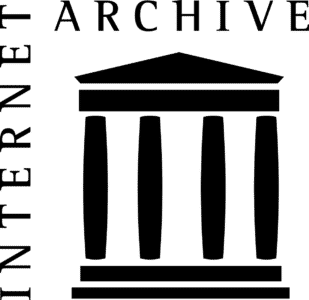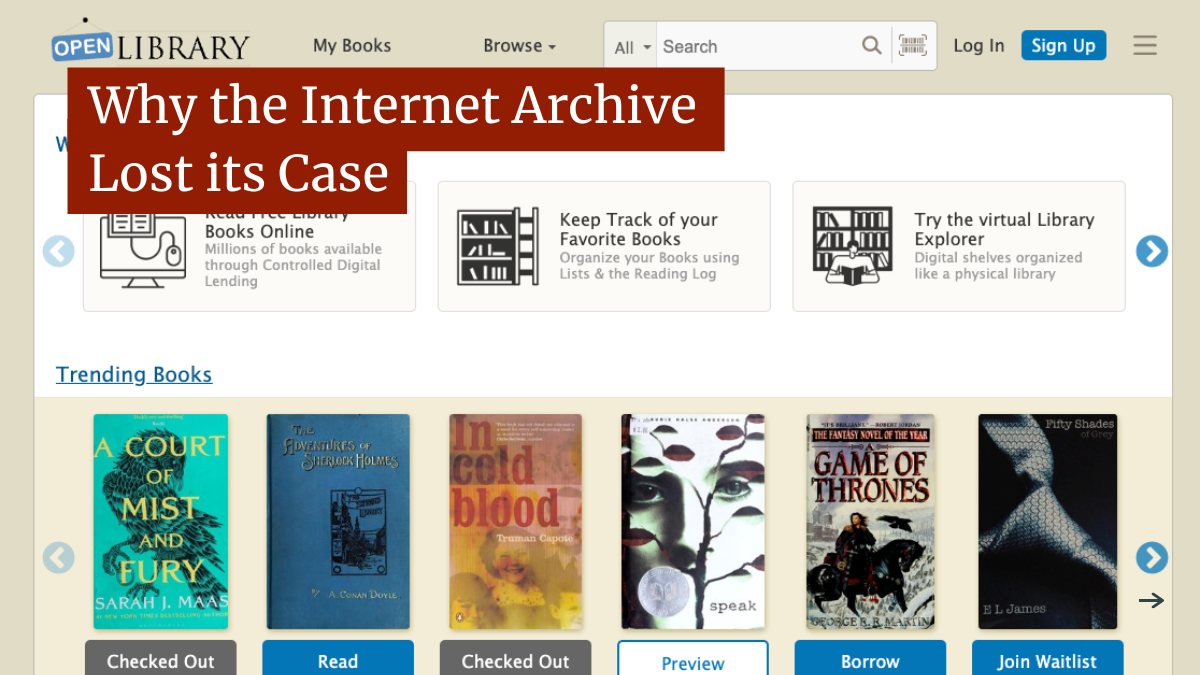Why the Internet Archive Lost

On Friday, a federal judge granted a motion for summary judgment against the Internet Archive (IA) (full decision) and in favor of a group of four publishers suing the site.
According to the judge, the IA’s “controlled digital lending” scheme was wholly unlawful. He said that their defense, “rests on the notion that lawfully acquiring a copyrighted print book entitles the recipient to make an unauthorized copy and distribute it in place of the print book.” However, the judge said that no case or legal principle supports that theory. In fact, he said, “Every authority points the other direction.”
For years, the IA has operated an online library-like service where they would scan physical copies of books and then lend out digital copies through their site. As a policy, they would only lend out as many copies as they had physical copies of a book. This is a process that they called controlled digital lending.
However, in March 2020, when the IA announced the launch of the “National Emergency Library.” In response to the COVID-19 pandemic and the lockdowns caused by it, the IA removed all restrictions on lending, offering up access to the books to anyone who wanted them, regardless of copies owned.
This prompted the four major book publishers to file a copyright infringement lawsuit against the Internet Archive. That case has been winding through the courts over the past three years, reaching the point of summary judgment last week.
And that summary judgment was a significant blow to the IA. Not only did the judge rule against the National Emergency Library, but against controlled digital lending as a concept. That, in turn, is the foundation of the IA’s “library.”
The IA, for their part, have promised to appeal.
However, most of those watching the case were not surprised by the ruling. Earlier in the week, the judge had expressed a great deal of skepticism about the IA’s arguments, and it already seemed that a ruling in favor of the publishers was likely.
That because, even if you support what the IA does, there’s not much doubt that its legal arguments are deeply flawed.
The Problem with Controlled Digital Lending
The IA’s argument centers around the concept of controlled digital lending (CDL). According to the IA, CDL is legal because they only lend out the number of copies that they lawfully own.
However, CDL, as the IA does it, requires the creation of a digital version of a physical book. Creating that digital copy for lending is, in and of itself, making an unlicensed copy.
To be clear, it doesn’t matter if the original physical copy is in storage and never lent out or read. The ReDigi case, which saw Capitol Records sue the “digital music reseller”, found that even deleting the original copy of a file didn’t mean that reproduction didn’t happen and that a copy was made.
As such, simply putting the original book in storage (or even destroying it) doesn’t change the fact that a copy took place.
That, by itself, doesn’t mean the copy is illegal. However, it has to be covered under one of the exceptions in copyright law.
For example, it’s generally taken for granted that individual users are able to rip CDs and other physical media to a digital format. However, that use is neither explicitly allowed nor forbidden. Regardless, it doesn’t extend to the public sharing, or “lending,” of content and is only limited to private use.
That’s why the Internet Archive leaned on a fair use argument. The organization likened itself to Google and specifically cited the Google Book Search case. In that case, the Authors Guild filled a lawsuit against Google over the search giant’s scanning of books to build a book search tool.
The case took over a decade to unfold, including a pair of settlements that were later set aside. However, in the end, both the district court and the appeals court sided with Google, ruling that its scanning was a protected fair use.
However, that fair use ruling hinged upon one simple fact: Google was trying to create a book search engine. Google was never going to publish the full works, only snippets. Furthermore, the courts found that Google Book Search did not harm the market for the original works and that it was a broader public good.
Most importantly, the courts found that Google’s use was transformative. It was aiming to make something new through its use of the books, not simply offer the same books.
This is where the IA’s arguments ran into trouble. Their library does not transform the books in any meaningful way, it simply converts them from physical to digital. As the judge wrote, “An e-book recast from a print book is a paradigmatic example of a derivative work.”
That lack of transformativeness is what separated them from Google. Transformativeness, as we’ve discussed in the past, is the single most important factor when it comes to determining fair use. This meant that the IA’s fair use analysis went very differently than Google’s, with a completely opposite verdict.
With the judge ruling that the IA’s use was not a fair use and there being no other exemptions, the judge felt he had no choice but to issue a ruling in favor of the publishers and say that the Internet Archive had infringed their copyrights.
We’ve Been Here Before
From a legal and practical standpoint, the IA case is the most similar to the Google Book Search case. Both involve many of the same legal questions, both involve the scanning of books, but one deals with the creation of a search engine and the other a library-like site.
However, on a more esoteric level, the case is much more similar to the VidAngel lawsuit.
VidAngel was a streaming service that focused on letting users filter out undesirable content such as vulgar language, sex and violence from films. However, they operated their service by letting users “buy” a physical DVD for $20, then stream that DVD (with VidAngel filtering) and sell it back for $19.
This prompted a lawsuit from the Hollywood studios. Though the studios quickly got an injunction against VidAngel, the case wound its way through court and was eventually settled in September 2020.
VidAngel now operates as a filtering service that works on top of legal streaming services, such as Netflix and Amazon Prime.
While the legal arguments between the two are very different, in both cases you have an organization that is engaging in clearly infringing behavior, but trying to couch that with language of legal services.
The Internet Archive refers to itself as a library, VidAngel referred to itself as a filtering service. However, in both cases, their behavior was nothing like what they compared themselves too. Filtering services don’t also stream movies, and libraries acquire digital copies to lend, not create new ones.
In both cases, the courts quickly saw through those arguments, it is part of a trend in the past decade of courts not looking at the technology behind a service, but looking at what the service actually does. In short, courts are more interested in what a service does than how it works.
If you look at it from that perspective, the Internet Archive is little more than a site that distributes unlicensed e-books. As I found in my own testing of the National Emergency Library, there was almost nothing to distinguish between the IA’s “lending” and a traditional e-book piracy website.
The judge in this case, clearly, felt the same way.
Bottom Line
Though the IA is planning on an appeal, they are in a tough position. As similar as their case is to the Google Book Search one, the differences between them are crucial and speak directly to the heart of what is and is not a fair use.
If the case had happened ten or fifteen years ago, the IA might have had a better shot. The Perfect 10 ruling, from November 2004, found that Google was not infringing by displaying thumbnails of images in the image search product, nor were they infringing for framing full-sized images.
Though the “server test” that case created isn’t relevant in the IA case, it was a peak time for courts looking at the technology behind a product to make decisions. The pendulum began to swing the other way in 2014, when the Supreme Court ruled against TV-streaming service Aereo.
Since then, the server rule has been chipped away at and courts have focused more on what a service does rather than how it does it.
But the truth is that the Internet Archive was doomed by a string of different factors. The ReDigi case found that even deleting an original copy didn’t change the fact a reproduction had taken place, social and legal norms offered the IA no protection for converting the books to digital and the Google Book Search case only highlighted how the IA is different from Google.
If one feels that the IA is in the right in this case and that what they are doing should be legal, a court was never the place to push that. The law is simply stacked too deep against the Internet Archive.
If you want controlled digital lending to exist legally, it needs to be done legislatively. However, that is unlikely to happen as massive copyright reform is a back-burner issue for the government at this time and such sweeping reform is going to face an uphill battle regardless.
As it is right now, both the law and the legal climate don’t favor the Internet Archive. For better or worse, neither of those are likely to change any time soon.
Want to Reuse or Republish this Content?
If you want to feature this article in your site, classroom or elsewhere, just let us know! We usually grant permission within 24 hours.
